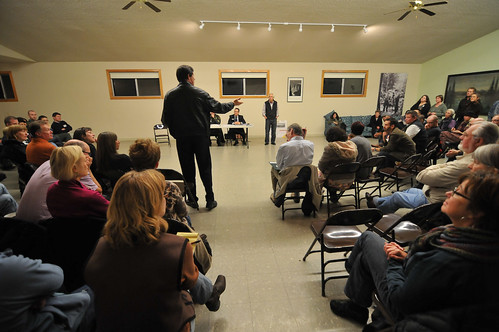
(Photos © J. Maus)
Last night well over 100 people packed into the Skyline Grange to discuss road safety issues and to share experiences of roadway interactions from both sides of the windshield. Roads outside the Grange hall — like Skyline Blvd, Rock Creek Road, and others — are very popular for bicycling; but they’re also narrow, windy, and shared with people in cars who live nearby.
“I felt threatened. Had I not been a skilled rider, I could have gone into a ditch. People need to know the laws… There’s no excuse for making dangerous maneuvers.”
— Brianna Walle, PSU student
Concerns about safety and behavior on these roads have been simmering for years, but they boiled over in August after several alleged incidents of harassment and road rage against people on bicycles were reported to the email list of the Oregon Bicycle Racing Association (OBRA).
Hoping to foster dialogue and find solutions, the Skyline Ridge Neighbors (SRN) decided to bring people together to clarify legal obligations and talk about the issues. The turnout was about evenly split between people who live in the neighborhood and people who ride bikes through it. There were also several folks that live, drive, and ride in the area.
Expecting some heated exchanges, SRN brought in a conflict resolution expert from Portland State University to facilitate a discussion. In addition, local bike lawyer Mark Ginsberg and Multnomah County Sheriff Captain Monte Reiser sat on a table in front of attendees to serve as experts on legal and law enforcement issues.
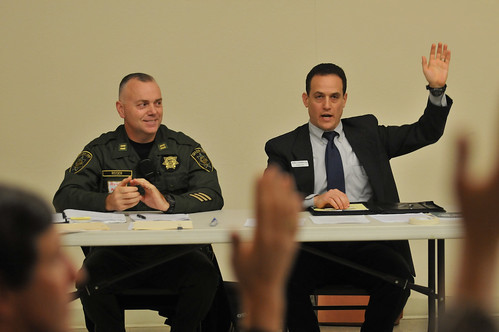
Also in attendance were Multnomah County Senior Deputy District Attorney Chuck Sparks, Chief Deputy DA Rod Underhill (who is also likely to become the next County DA), OBRA Executive Director Kenji Sugahara, Portland Velo President and Director Kevin Rhea, Multnomah County Transportation Planner Joanna Valencia, members of the SRN neighborhood association board and many residents and other concerned citizens.
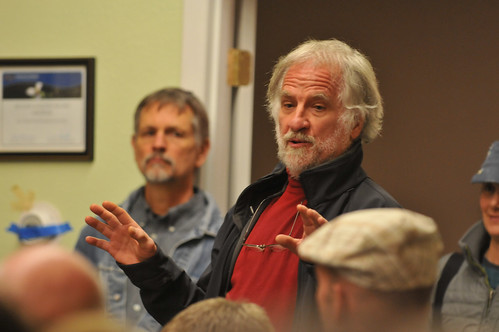
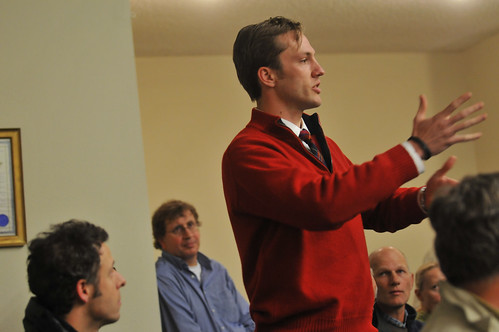
In a move that helped set a civil tone for the evening, the facilitator started the meeting by asking everyone to turn to someone sitting next to them and introduce themselves. The event also began with Captain Reiser and Ginsberg reviewing Oregon State Statutes regarding safe passing, impeding traffic, and other relevant issues.
Capt. Reiser reminded the crowd that “Driving is a privilege” and that people on bicycles, for the most part, must adhere to all the laws that govern motor vehicles. Ginsberg encouraged people to replace “bicycle” with “car” when they think about roadway interactions and collisions. “And if you think the situation is different, I’d ask you why? The rules are the same for all vehicles.”
To help clarify the laws, Ginsberg had passed around a sheet of paper with six applicable Oregon statutes.
One of the first legal issues to be brought up was whether or not someone in a car is allowed to cross over a double yellow line to pass someone on a bicycle.
“The simple answer is yes,” Ginsberg said, “The law is very clear. You can do it, you’ve just got to do it safely.”
As Ginsberg spoke about this, a man in the back of the room interrupted him with a different interpretation. He insisted that they had it wrong. Instead of cars being able to legally pass over the double yellow, he claimed, it was bicycle operators who were supposed to pull over — off the main roadway — to let cars pass.
“It’s pretty evident [according to the law] that a bicyclist needs to pull off the main traveled portion of the roadway,” the man maintained. “I’d like the sheriff to read it out loud so everyone can hear it.”
The man repeatedly requested that Capt. Reiser read out loud ORS 814.430 (2) (c), “Improper use of lanes”. In the interest of civil dialogue, the facilitator asked the man to identify himself.
“I’m Scott Wheeler,” he said, to which I heard several people in the crowd whispered to themselves, “Big surprise.”
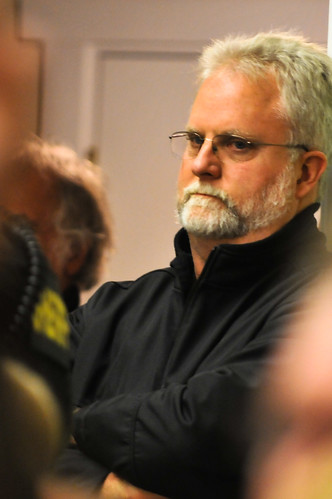
Wheeler is the man accused of harassment and menacing behavior against people riding bikes while driving his truck outside his home on nearby Rock Creek Road. Wheeler has also filed several formal complaints with the Oregon State Bar against bike lawyer Ray Thomas for “circulating misleading legal information to the public” about the the passing statute.
At the meeting, Ginsberg disagreed with Wheeler, telling him that a “bicyclist is entitled to the full lane” and that, “as a slow moving vehicle they have nowhere else to go.” “I understand, Mr. Wheeler, you may not agree with that, but the law is pretty clear.”
Capt. Reiser added: “My understanding of the law, is that when you have a bicyclist riding solo, as safely as possible… and if you have a driver that comes across that bicycle coming from the rear and there’s no bike lane, that driver, if they make determination to do so, can go around that double yellow line.”
A woman who was videotaping the meeting (and who left with Wheeler well before the meeting ended) wanted to know who would be at fault if a car crossed over a double yellow to avoid someone on a bike and was then involved in a collision. Capt. Reiser and Ginsberg said there are too many potential variables to answer that question.
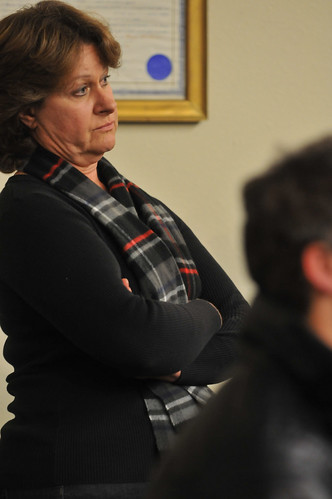
passing on a double yellow, they deem
it safe and then end up in an accident?
What happens to the driver? Who would be at fault?”
When she offered that her 16-year old daughter doesn’t have good judgment and could be at “higher risk” in a passing situation like that, someone blurted out “Then she shouldn’t pass!”.
Despite the repeated insistence by Scott Wheeler to rely on his strict interpretation of the law, the Sheriff and Ginsberg said that in reality, both the courts and police officers rely heavily on judgment and discretion when interpreting the law.
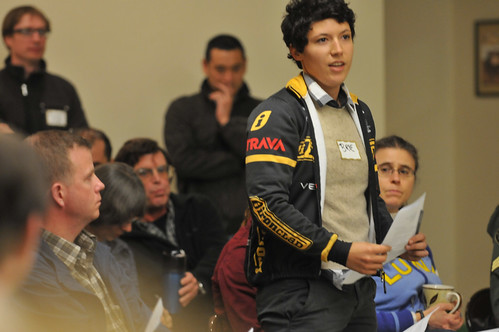
The next person to stand up and share their perspective was Brianna Walle, the woman whose allegations of harassment against Scott Wheeler we detailed in back in August. Walle, wearing her Team Ironclad jacket, stood up, looked across the room at Wheeler and shared the two run-ins she had with him.
Walle recounted that she was riding on Rock Creek Road and heard excessive honking even though there was, “plenty of room to pass and visibility was good.”
“I felt harassed, so I stopped and he flew by, within a foot of my face.”
A month later, Walle continued, the same thing happened again; except that time she rolled up to Wheeler’s car to try and have a conversation. As we reported in August, the conversation didn’t go well:
“He started yelling out some statute… “You are a slower moving vehicle and MUST pull over to side of road since you are slower than traffic! I can’t pass you on a double line.” As I started to explain my reasoning, he drove off.”
“On those two occassions,” Walle said, “I felt threatened. Had I not been a skilled rider, I could have gone into a ditch. People need to know the laws. At the end of the day we all have some place to go. There’s no excuse for making dangerous maneuvers.”
Walle’s courageous testimony, with Wheeler staring at her just feet away while she spoke, set the tone for the rest of the evening.
After Walle’s story, a man stood up and said, “We shouldn’t be so beholden to one set of laws while ignoring other laws that govern our behavior.”
“Those bicyclists riding abreast, once they realize a motorist is behind them, they need to make a reasonable effort to move over.”
— Mult. Co. Sgt. Bryan White
The rest of the meeting was marked by constructive dialogue. Many of the people who showed up rides bikes and drive cars in the area. Several others who ride on the roads also live in the neighborhood. Those that don’t ride bikes had honest questions:
Is riding in the middle of the lane OK?
Is a driveway considered a safe place to pull over?
Is riding 2-3 abreast allowed?
Each question was responded to by the Sheriff (if necessary) and by people who ride, giving people a more intimate understanding of bicycling behavior.
On the issue of riding 2-3 abreast, Multnomah County Sergeant Bryan White (who patrols the area regularly) again said that it’s about discretion. “Do they have to move over? It’s going to depend on the situation.” Sgt. White said that the law about impeding traffic also comes into play. “Those bicyclists riding abreast, once they realize a motorist is behind them, they need to make a reasonable effort to move over.”
Throughout the exchanges, there seemed to be a lot of education going on for people on both sides of the windshield.
“If you’re riding downhill and you can’t hear me,” said a woman named Kate who lives in the neighborhood, “How could I alert you that I’m coming up behind you? I feel like if I get too close it’s scary, if I honk it’s scary. Practically speaking, I’m asking the bike community, what should we do?” (The general consensus was that a short toot of the horn would suffice.)
A woman who introduced herself as a mom and a neighbor was curious why people would ride two abreast or take the lane. “Is it a social thing? Do you ride in the middle because you think you won’t be seen?”
Tom Hoffman, who has been riding in the area for decades said that when he hears a car coming up from behind, he’ll wave them through to help them pass when it’s safe. “If I’m in the way, I trust that you’re human enough that you’re not going to hit me.”
Countering that perspective was a woman who said, “I don’t want to be told when to pass,” and another who was worried that a bicycle rider waving them through could lead to liability issues. In the end, the point was clearly made that it’s ultimately up to the person passing to determine whether it’s safe or not.
Putting another human face on the dialogue was Susan Peithman with the Bicycle Transportation Alliance. Peithman is not only a BTA staffer, she’s also a competitive racer who trains on the roads around Skyline Blvd. Speaking to the crowd she said, “I want to thank you for sharing your community with us. These roads are treasures and we have a vested interest in making sure you are all happy.”
While interactions at the meeting were very positive and cooperative, it was clear by the testimony of several residents that there remains considerable hard feelings toward bicycle riders among some locals.
“Most of the people who ride up here bring an urban biking mentality into a rural area,” said a man who has lived in the area for 30 years, “Most people I know are antagonistic toward bicyclists because they don’t ride bikes themselves… Even though the BTA says they love us, a lot of the residents feel like we’re being abused.”
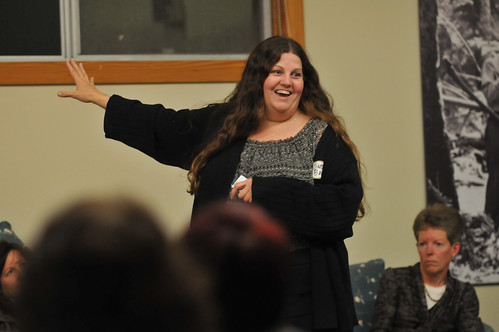
Even so, Cindy Banks, president of Skyline Ridge Neighbors made it clear to everyone that people like Scott Wheeler do not represent the neighborhood. The general feeling, she said, is that sharing the road with bikes and cars, “Kind of sucks and it’s kind of stressful but we all hope we can make it better.”
But what about Scott Wheeler? One woman who lives in the neighborhood and rides a bike wanted to know whether or not Wheeler had been flagged by authorities.
Ginsberg said that the Portland Police Bureau and Multnomah County Sheriff’s Department have investigated several incidents, but that Wheeler “hasn’t to be charged with any traffic violations or crimes” — “yet!” added several people in the crowd.
Capt. Reiser said in order to cite someone a Deputy must observe the infraction first hand. Otherwise they need a victim to sign a complaint against Wheeler. The Sheriff also informed the crowd about the citizen initiated citation process and Ginsberg urged anyone who is victim to harassment to call 911 and share as many details as possible.
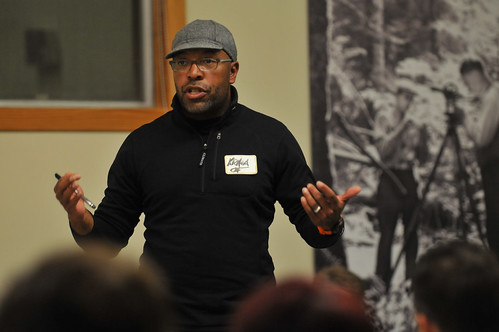
Toward the end of the meeting, the discussion turned to concrete solutions and actions. Below are some of the ideas:
- Widen the road in blind corners and/or create “safe passing zones.” (I like the idea of “slow vehicle turnouts” for bikes like are common on mountain roads.)
- Start a PSA and messaging campaign to promote “common sense behaviors.”
- Have Multnomah County conduct a road safety study and do more speed limit enforcement.
- Request more roadside maintenance to remove weeds that end up narrowing the road even further.
- If City won’t provide maintenance, do it grassroots style and have a clean-up day.
- If County won’t invest in the road, create a ‘Friends of Skyline’ non-profit to raise the money for new infrastructure.
OBRA Executive Director Kenji Sugahara said he plans to contact every team leader to make sure they get the message to ride as courteously as possible on Skyline and surrounding roads. He tempered that commitment by telling residents, “There are cyclists who are jerks and there’s nothing I can do about that.”
When a member of the Skyline neighborhood board said they were hoping to do a signage campaign along the roads directed at people in cars and on bikes, Mark Ginsberg immediately pledged $1,000 to help make it happen.
Putting a sobering yet hopeful bookend on the night was Multnomah County’s Chief Deputy DA Rod Underhill, who happens to be a self-described, “avid cyclist.”
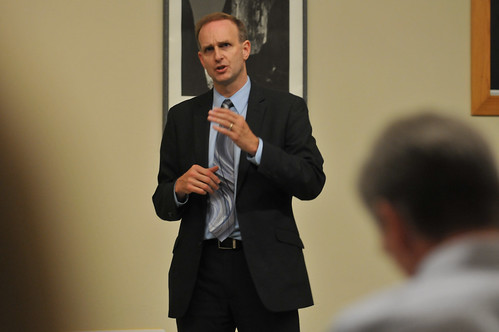
Underhill said this issue is on the DA’s radar. “Because of the things we’re hearing about, some of the events out here have gotten our attention. We’re listening.” He also described what an “awful” experience it is to respond to the scene of a fatal bicycle collision. “We don’t want to see these tragic situations to come across our desk.”
“The best thing possible has happened tonight. Dialogue. We got to put faces to each other tonight,” he continued, “Let’s keep talking, I think we’ll all learn from this as we go forward.”

